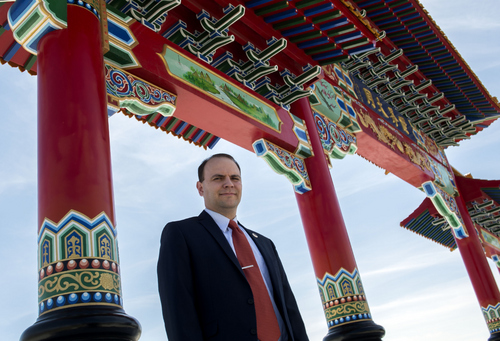This is an archived article that was published on sltrib.com in 2014, and information in the article may be outdated. It is provided only for personal research purposes and may not be reprinted.
West Valley City • For years, officials of the state's second-largest city envisioned a multicultural center of shops and restaurants next to the Jordan River that would showcase the diversity of the community and serve as a destination spot.
But the Jordan River Marketplace struggled to get off the ground and now the West Valley City Council has put the project on hold indefinitely.
The council voted unanimously late last month to reject Ascent Construction's proposal for the first phase of the project, which was to be built at 3300 South and 1200 West, south of the Utah Cultural Celebration Center. A development agreement between the city and Centerville-based Ascent expires on Sept. 1 and West Valley is not renewing it.
Ascent officials did not return calls seeking comment.
The decision to drop development plans means the 18-acre site remains vacant. The question now arises what to do with the property.
West Valley City Councilman Corey Rushton, past chairman of the Jordan River Commission, is recommending a fresh look at what types of development should be built along the entire waterway. He wants to bring together public entities, private groups and others to discuss preservation of the river corridor and acquisition of open space.
"Our ultimate goal should be to better define what a 'River Center' actually is, and to demonstrate how to employ best practices to have the focus of any future development be sighted towards the River itself and not just the manufacture of a development," Rushton wrote in a letter to his fellow council members.
Rushton also is urging West Valley City to adopt a riparian corridor ordinance to protect its section of the Jordan River.
The commission says in its blog that it looks forward to the opportunity to work with West Valley City "to reimagine the future of this property in context of the Jordan River."
The idea for the marketplace project has its roots in a master plan crafted by the city a decade ago that said the vacant area near the Cultural Celebration Center, 1355 W. 3100 South, should be used as a gateway to West Valley.
In 2008, the city solicited proposals for the land — which is part of the Jordan River Redevelopment Area — and signed a development deal the next year with Ascent. The plan was to have shops and restaurants that reflected West Valley's diversity. With about 45 percent ethnic minority, it is the closest any major Utah city has come to a majority minority population. Offices and residences also were going to be part of the mix.
The city had paid $4 a square foot for the land in the late 1990s. Under the development deal, Ascent was to pay $3 a square foot, with the payment coming from tax increment — the taxes generated from the increased assessed value of a property within a redevelopment area. The agreement also required the developer to complete $8 million worth of construction by Sept. 1, 2013. That deadline was later extended to Sept. 1, 2014.
Construction originally was expected to begin soon after the agreement was signed in 2009 but a start date was delayed as the city and developer held detailed discussions about the project vision. Ascent presented proposals for a charter school and a high-density apartment complex but those specific plans were turned down by the City Council; Some members thought the multi-family housing was too dense for the area and that a charter school would not fit in well with the mix.
At the March 25 council meeting, Ascent asked for the green light to start building the first 220,000 square feet of the commercial part of the marketplace. Vice President Bob Murri said financing was lined up, leases had been negotiated with many restaurants and construction could begin in early June.
"This will absolutely be the crown jewel of West Valley City and no other city in the state will have it," Murri said.
Others speaking in support of the Ascent plan included Alan Anderson, president and CEO of ChamberWest, a regional chamber of commerce, and state Sen. Karen Mayne, D-West Valley City. Former West Valley City mayor Mike Winder, a consultant on the project for Ascent, also urged a yes vote.
But council members could not be convinced to move ahead. They said money was a big obstacle: Under the redevelopment time-frame, there would be just five tax-increment payments left, estimated to total about $950,000 from 2015 to 2019 — less than the city's nearly $1.2 million purchase price for just the 9 acres earmarked for the first phase.
Councilman Steve Buhler said the development would work as a private project but too much time had passed for it to make financial sense to fund it with taxpayer money.
Rushton agreed and pointed out that the property was appraised in 2009 at almost $11 a square foot and probably was worth more now.
"When you do the numbers," he said, "the payoff isn't there."
Twitter: @PamelaMansonSLC



